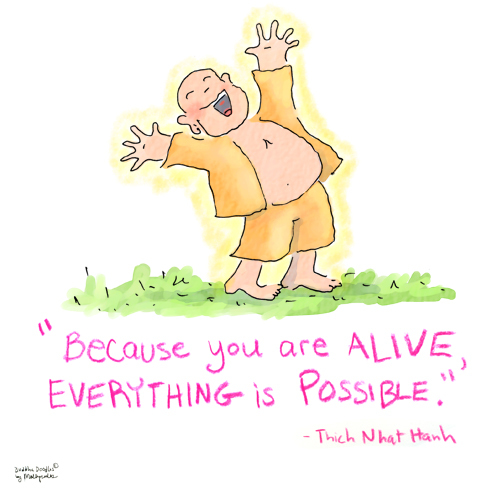Many media outlets have been talking for a number of years now about how ubiquitous mindfulness is, the impact it's having in a variety of sectors and all the wonderful science that continues to be published. But I noticed that many people in the media don't talk much about the actual formal practice of mindfulness meditation and that's probably because it can be a hard habit to establish. One thing I've learned is if you want to establish a practice you have to look directly at what's getting in the way and allow those obstacles to be your greatest teachers.
Here are five obstacles that have been in people's way for thousands of years and the antidotes to get over them.
Doubt
The uncertainty about whether something will "work" or not often plagues many people in the beginning of their practice. The thoughts is, "this can work for others, but it won't work for me." Sometimes doubt is healthy, teaching us to look closely at things before we buy them. But the unhealthy doubt just takes us away from experience before it teaches us anything.
Antidote: We have to remember that thoughts are just thoughts; they're not facts (even the ones that say they are). When we notice this doubt slipping in, just take note of it, perhaps even notice the fear that is often underneath it, and then gently return back to the practice.
Restlessness
Let's face it, it's hard to sit still for a period of time when the mind can be so busy. We're trained from a young age to do, do and do some more. The mind may rebel a bit when learning how "to be." You might catch it running through a million to-do lists and try and count the minutes until the end of the practice. This is all completely natural.
Antidote: It's important to recognize that restlessness and boredom are just sensations like any other. If you look deeply at restlessness or boredom, underneath it is often some form of anxiety or fear. But you don't need to investigate it to reduce its impact, just naming it as you recognize it can really reduce its impact. You might even try adopting a beginner's mind and getting curious about the sensation of restlessness. This is how you get back in the driver's seat.
Irritation
Getting irritated occurs for many reasons. Maybe we don't feel like we're having a good meditation experience or there's an annoying noise in the room or it's a secondary emotion that comes after feeling restless. In other words, we're irritated that we're so restless in the practice.
Antidote: While our urge is to resist the irritation, we have to remember the old adage "what we resist persists." The work here is to include it as part of the mindful experience. As the chapter goes in The Now Effect, "It is what it is, while it is." Our work is to recognize the irritation, allow it to be there and we can either investigate it deeper or watch as it naturally comes and goes.
Sleepiness
Being the sleep deprived nation that we are, it's easy to feel a bit sleepy when we come down from our busy minds. Our body does what it naturally wants to do, go to rest. We also feel sleepy sometimes when an experience is overwhelming, so it's good to be curious whether the tiredness is telling you that you need more rest or that there's a feeling that needs to be expressed.
Antidote: If from time to time you fall asleep when meditating, consider it a good nap that you needed. However, if this is happening often you might try sitting in a more upright posture, standing up, having your eyes slightly open or maybe splashing some water on your face before starting.
Wanting
You'll notice when you practice that your mind may fall into a state of wanting to be somewhere else than where you are. Or maybe it's even more innocent of just wanting to get a bite to eat and so the mind starts drifting onto different food topics. Or before you even get to practice your mind wants to conditions to be different than they are so you don't even get to practice. This state of mind can either stop us from practicing or ignite restlessness, irritation and others.
Antidote: If you notice this state of mind before you practice, you might consider what you can practice instead of what you can't practice. For example, in a noisy place, the Sky of Awareness practice from The Now Effect would do quite nicely. If the mind is busy wanting to be somewhere else during the practice, see if you can be easy on yourself, simply continuing to notice the thoughts straying and gently bringing your attention back. If it's continues to be a strong pull, maybe intentionally shift your practice to being aware of thoughts like in the Movie in Your Mind practice.
Ultimately, having a regular mindfulness meditation seems so simple, but practice isn't always easy. We have our brains to contend with that throws up all these obstacles.
Even if you just made it your intention to be on the lookout for these obstacles and apply the antidotes as best you can, that would be an extremely beneficial practice.
Be forgiving of yourself as you go and remember you can always begin again.
Adapted from Mindfulness and Psychotherapy
